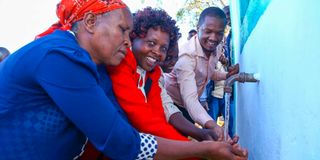We should step up investment in the environment

In this picture taken in October 2018, residents of Murara in the company of EABL Group Corporate Relations Director Eric Kiniti (far right), enjoy clean water from a water kiosk donated by Kenya Breweries Limited (KBL) in Murara, Igembe North Constituency, Meru County.
What you need to know:
- The effects of climate change have necessitated worldwide campaigns and summits like the just ended COP 26 in Glasgow.
- These talks are important to Africa, which is disproportionately the most vulnerable region to climate change.
Take a moment and think of how much you enjoy being at home after a busy day out. You probably agree with the adage, “East or West, home is best”. We have all at one point benefited from the ambiance and support system that a home provides — helping us unwind and re-energise.
The truth is, it is not only humans, but also other species of plants and animals that need a good home to survive and thrive. All existing biodiversity finds a home in Mother Nature – in the oceans, air, and on land. We must conserve and care for this home.
The negative effects of not doing this have been evident – irregular rainfall patterns, heat waves, soil erosion, poor air quality, water scarcity, and undrinkable water. The most challenging global consequence is ultimately climate change. Its effects have necessitated worldwide campaigns and summits like the just ended COP 26 in Glasgow. The summit had discussions on issues such as energy efficiency, climate finance, agriculture, forestry and ecosystems, and water and sanitation, among others. The role of business and private sector also came up.
These talks are important to Africa, which is disproportionately the most vulnerable region to climate change. For example, water scarcity in Africa is expected to reach dangerously high levels by 2025, affecting millions of people. In Kenya, approximately 16 million citizens lack water. This harsh reality necessitates urgent measures, including the responsible use of natural resources. We need to find innovative ways to reduce, reuse and recycle water in our operations.
At East African Breweries Ltd (EABL), we have reduced our water consumption by 25 per cent over the past five years through several measures — including investing in wastewater treatment and water recovery systems in the Nairobi, Kisumu, and Uganda plants. These plants save up to 150 million litres, 55 million litres and 300 million litres of water a year, respectively.
Reduce carbon emissions
We also aim to provide access to clean water to communities through our Water of Life programme in Kenya, Uganda, and Tanzania, that has reached over 30,000 people in the past year and over 2.5 million people in Kenya alone throughout the initiative’s lifespan. Another key reflection at COP 26 is the need to reduce carbon emissions. US President Joe Biden’s administration launched a plan to reduce methane emissions, as part of a broader global effort. There were also net-zero pledges on reducing carbon emissions.
The private sector, especially manufacturing companies, can plug into this commitment to reduce carbon emissions. This can be through making the necessary environmental investments such as EABL’s announcement in 2019 that included commitment to replace its heavy fuel oils with biomass boilers that will help reduce its carbon emissions by 95 per cent. This is Diageo’s largest environmental commitment in all of the Pan-African region, and will be used to install biomass boilers, solar panels, and water recovery plants in the breweries.
Thirdly, there was the landmark COP 26 promise to end and reverse deforestation by 2030. Trees are a natural carbon sink and tree planting is an initiative that individuals and companies can be involved in.
EABL has carried out robust reforestation and afforestation throughout Kenya, Uganda, and Tanzania — planting over 1.5 million trees in the past 10 years. We have cumulatively restored 2,150 hectares of degraded forest land in Mt Kenya Forest and Navugulu Forest Reserve in Uganda. Finally, COP 26 demonstrates that this world’s problems can be solved faster through concerted efforts and partnerships.
EABL prides itself in forging an extensive list of partnerships for the various sustainability initiatives that we champion.
All these and more, as embedded in our spirit of progress strategic plan, showcase our commitment to environmental stewardship. We call upon other private sector members to join this sustainability movement.
The writer is EABL group managing director and chief executive officer.





